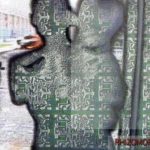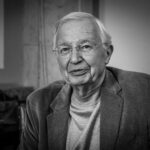“Diminishing Dimensions” by Brad Miller, Peter Lowe
Title:
- Diminishing Dimensions
Artist(s) and People Involved:
Exhibiting Artist(s):
Symposium:
Artist Statement:
- K. Eric Drexler, Visiting Scholar, Department of Computer Science, Stanford University
- Jean-Marie Lehn, Universite Louis Pasteur, Nobel Prize for Chemistry 1989
- Richard P Feynman, Nobel Prize for Physics 1965
- Ralph Merkle, Xerox, Palo Alto Research Centre
- Stuart Hameroff, anaesthesiologist, Department of Anaesthesiology, University of Arizona
- Lester Milbrath, Emeritus Professor, Environment and Society,
- Suny Stephen Mill, Centre for National Policy Research, Department of Sociology, University of Wollongong
Producers Statement
Radio broadcast
We live in a shrinking world. Previously we began by exploring the world around us. Having explored that world we then began to explore the world that was beyond us, the extraterrestrial world. Whilst that project remains unfinished we have now begun to explore another, more intimate world – one that we hardly realised existed before the invention of the microscope: the atomic world.
Nanotechnology is the latest buzzword in the jargon of astrophysicists, molecular biologists, and chemists – the development of which straddles each of these diverse disciplines. lt is a development that entails a molecular revolution in the way we are able to perceive and deal with the very building blocks of matter. The term nano, meaning a billionth, is an indication of the terms of scale that the new technology deals with.
This program is a fragmented sound map which seeks to image the terrain of fundamental quantum reality. It is a strange world of paradoxical reality. Invariably, when scientists talk of the atomic world, they begin talking about the blurring of the fundamental distinction between energy and matter.
The venture into this endophysical realm has been touted as “the most powerful technology that the world has yet developed”. This being so it is seen as a portent of things to come: the abolition of disease, increased longevity, minimised environmental pollution and the like. Yet the new technology has its critics who are concerned about the moral and ethical dilemmas which they see as the outcome of the development of such a radical technology.
The voices of the following will be heard during the program:
Executive Producer: Tony McGregor
Producers: Brad Miller and Peter Lowe
Mix: Andrew Clarke-Nash
Original recordings: John Jacobs, Ian Andrews and Jason Gee
Pre-production: Steve Tilleys
Special Thanks: Roz Cheney, Heather Grace-Jones, Simon Mahoney and Gary Bradbury
All Works by the Artist(s) in This Archive:
- Brad Miller

A Digital Rhizome
[ ISEA94]
Diminishing Dimensions
[ TISEA]
mediated_moments and plasma_flow
[ ISEA2013]- Peter Lowe

Diminishing Dimensions
[ TISEA]





